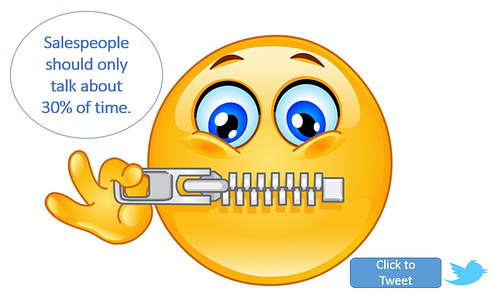In most industries there’s no lack of competition, which means professional salespeople need to up their game. How does a sales professional selling into the B2B space up their game? One of the ways is to avoid doing things that frustrate buyers – avoiding the 7 deadly sins of sales.
My firm conducted a survey of over 100 people who make buying decisions for their companies; buying things like IT services, capital equipment and a variety of professional services. During this research we discovered things salespeople do that frustrate a buyer during the sales process. This article explains those 7 deadly sins.
Talks too much/sells too hard
It’s widely known that poor salespeople have a habit of “showing up and throwing up”. They talk too much about themselves, their companies and their products. They make statements before asking questions. The fail to embrace one of the habits of highly successful people – “seek first to understand, then to be understood”.
Our research suggests that salespeople should be talking no more than about 30% of the time, using the other 70% to ask questions that help identify challenges buyers are facing and how you may be able to solve those challenges.
Tries to manipulate me into saying “yes”
Using closing techniques like the “alternative close” or the “puppy dog close” to manipulate a buyer into saying “yes” turns off buyers. Research proves there’s an inverse relationship between the price of a solution and the closing techniques used – the higher the price, the less closing techniques will get you the sale.
More than any other issue, the use of closing techniques turns the buyer off the most. In another article I wrote, “Sales closing techniques – use them or not?”, I go into more depth about closing techniques.
Disorganized and unprepared
Showing up late, failing to properly prepare, unable to find things and/or uncertain about the details of the products and services being sold – who wants to buy from someone like this?
Salespeople must realize the buyer has to make 4 decisions before buying from you in this order; 1) they buy you first, 2) they buy your company, 3) they buy your product/services, and 4) they have to buy your price. But first they have to buy you, and if you’re not organized and on top of the situation, you’ll never sell yourself or anything else.
Interrupts me when I’m talking
As a professional salesperson you’re there to learn about your buyer and his/her business, to uncover and understand the buyer’s problems, and then figure out how your products and services can add value. You’re there to ask great questions and listen actively.
In many ways buyers take risks to give you information about their business, so stop coming to conclusions before the buyer is finished explaining things and interrupting the buyer while he is talking. You’re there to build rapport and learn, and you’ll fail to do both if you aren’t patient while your buyer is explaining his situation.
Wastes time on unnecessary details
Our research revealed that one of the most valued traits in a salesperson is the ability to solve the buyer’s problems. To accomplish this a salesperson has to ask the right questions, listen actively and probe for details. There’s no time to waste on things that don’t add value.
Some salespeople continue to work on building rapport long after the buyer is fully engaged. That’s not necessary. Explaining details about the product/service that aren’t germane to the problem being solved wastes time, complicates the matter and turns the buyer off. It’s unnecessary to communicate details unless they are directly related to the solution.
Avoid blabbering about all the features and benefits of your products/services. Understand the buyer’s problems, and focus your recommendations and solutions accordingly; not investing time to tell the buyer about all the other wonderful things your products/services can do.
Long presentations about his/her company
We asked buyers how much time a salesperson should take to tell the story about his company. Nearly half the respondents said less than 5 minutes, and another more than two-thirds said less than 15 minutes. In total, more than 80% of respondents in our research said less than 15 minutes.
Long presentations about your company will turn your buyer off faster than anything. Don’t go there. In the B2B space buyers are interested in 4 main things about your company; 1) do you have the capabilities to do what the buyer thinks needs to be done, 2) do you have the personnel to do it, 3) do you have references to support your ability to do it, and 4) who else have you worked with.
Whatever presentation you make about your company, keep it short and simple, and answer those 4 questions in the most succinct way possible.
They call too often asking for a decision
We asked buyers “what frustrates you the most about a salesperson’s behavior between the time a proposal is presented and a decision made?” 75% of respondents said the salesperson calls too often to ask for a decision. Interestingly, slightly more than half the respondents also answered “they forget about me”. A bit of a paradox. In any case, don’t do either.
How to best follow up between the time a proposal is presented and a decision made, read my article “5 ways to follow up on sales proposals”.
In summary, we’re all sinners, right? But seriously, salespeople who can avoid these 7 deadly sins, will build stronger rapport, be a better trusted advisor, and sell more valuable solutions.
You may also be interested in ...
Success of Small Business Salespeople – a Formula to follow
Improve Your Selling Skills – Be a Better Listener






Agree, disagree, or just have something to add?
Leave a comment below.